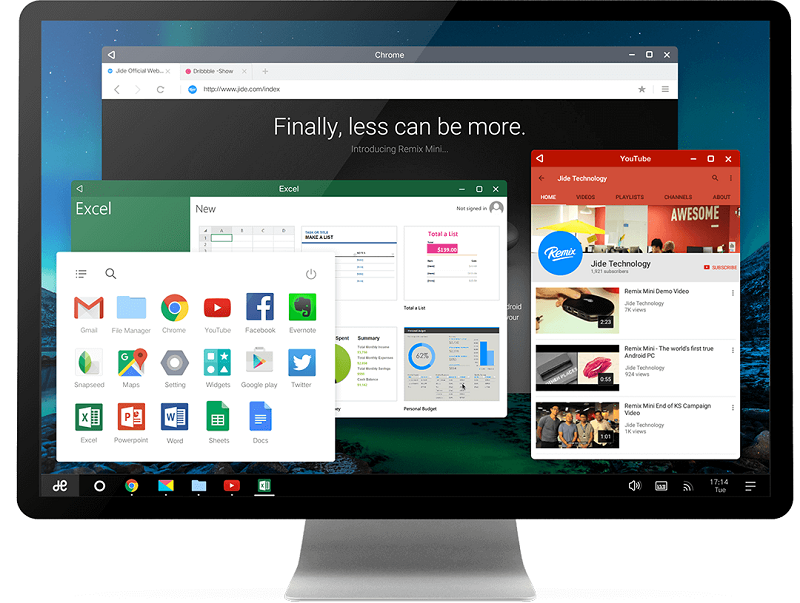
Those responsible for Jide, the company founded by former employees of Google, have announced a radical change of strategy. They will no longer offer Remix OS as a product for end users and will target it entirely to business users.
The famous version of Android that was designed to work on our PCs and laptops is therefore a professional alternative, but fortunately that idea of convergence brought us Remix OS is very lively thanks to several alternatives.
Remix OS puts on suit and tie
The announcement not only affects this mobile operating system reconverted to the desktop operating system, but also has an impact on the company’s hardware products, which will be recalled. Users who invested in their Kickstarter collective financing campaigns will be left without them, but the company has promised to return the money to all of them.
At Jide, they seem to have been frightened by the increasing competition in that ambition for getting a mobile platform to jump to usage scenarios we would normally cover with a desktop PC or laptop.
In fact the alternatives are varied, but that does not detract us so that we regret that decision. Remix OS quickly became a benchmark of where platforms like Android could go if they wanted to conquer the desktop, and proposed a solution to the convergence that would allow using a mobile as a desktop PC, for example.
In Jide explained that after collaborating with several companies have realized that there was a great opportunity in the professional market, “and given our current resources, we have decided to focus our efforts in the business segment from now on.”

Competition tightens, and Remix OS has not been the only victim
The decision of those responsible for Jide surely makes sense from the financial point of view, but surely many end users who saw (see) Remix OS as a reference in this ambitious convergence will be disappointed.
She is not the only one who has had to throw the towel, although in this case they have done so only partially. Recently Canonical officials announced the definitive farewell to convergence based on Ubuntu, for example.
This was another project that made us realize how interesting it could be to use a phone as a desktop computer thanks to an interface and “adaptable” applications. The complexity was enormous, however, something that was demonstrated with a platform like Ubuntu Touch that never finished being sufficiently mature and that advanced too slowly.
In front of these two projects began to consider alternatives more and more striking of the great. Google Chromebooks are the perfect example, as support Android applications – although the results are still somewhat limited – gave a new meaning to these computers.
In fact there is also that promising announcement from Microsoft and Qualcomm. Both companies demonstrated that Windows 10 and legacy x86 applications could run on a Snapdragon 835, and Windows 10-based ARM laptops are just around the corner. Jide got competitors everywhere, but there were even more projects that threatened its relevance in the end-user arena.
You may also like to read: Windows 10 will run on ARM, how will it affect Android?
Apple, Samsung, Google and Microsoft, to convergence
Remix OS may demonstrate how well a mobile platform (with its applications) can work on a PC or laptop, but that does not seem to have been enough to capture the interest of industry and end users.
We had not heard of this project in a long time, and perhaps its limited resources have made it want to make the leap to this new business orientation. The alternatives, however, are there, and among them stand out those of these four technological giants …
- Apple: What we have seen of iOS 11 in the iPad Pro shows that this operating system could very well be protagonist in all types of productivity scenarios and not just content consumption. The iPad Pro takes on a new meaning with that version of iOS 11 in which we already have the Dock or a task management more similar to that of macOS, and that makes these tablets convertible into rivals of all types of conventional notebooks based both in macOS as in Windows.
- Microsoft: The definitive farewell to Windows Phone makes it clear that Windows 10 is the future of this company in the field of mobility, and although today we are faced with an uncertain situation, it has already been proven that products like the Lumia 950 / XL they wanted to follow that path of convergence, as have the HP Elite x3. The launch of the Surface Phone, moreover, seems imminent.
- Samsung: The South Korean company has given a surprise with Samsung DeX, the peripheral that allows to connect the Galaxy S8 / S8 + to a monitor, keyboard and mouse and enjoy a work session that is already very close to the experience offered by a PC or a conventional laptop.
- Google: Things have not cleared up in the search giant, which is strange when Remix OS seemed to show the way that could go the future of Android. However there are interesting movements with Fuchsia, that mysterious development that could end up catching the witness and do it also with convergence as one of its pillars.
Obviously, they are not the only ones who can offer that convergent experience with which we wanted to win Remix OS. There are several projects that look exactly like Jide’s, but that seem to have a promising future. Phoenix OS, AndyOS or MaruOS are among them, so it seems that we will have options for all tastes.
